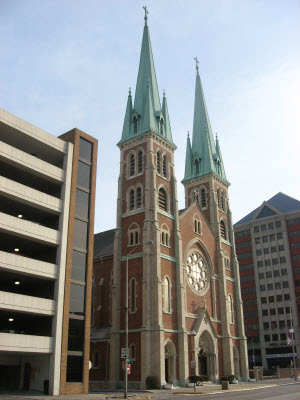
 his whole blogging thing can be a difficult thing to manage on a schedule (not to mention my children’s supernatural sense that something productive is happening in this room right now). “Come up with something good to talk about, right now” is not one of my talents. Talking? I’m a master (just ask my wife). Having something substantive to say, not so much. Therefore, I was grateful when Jeff Ostrowski gave me a great idea for this week: the CMAA Colloquium, specifically next year’s installment. Allow me to express my excitement.
his whole blogging thing can be a difficult thing to manage on a schedule (not to mention my children’s supernatural sense that something productive is happening in this room right now). “Come up with something good to talk about, right now” is not one of my talents. Talking? I’m a master (just ask my wife). Having something substantive to say, not so much. Therefore, I was grateful when Jeff Ostrowski gave me a great idea for this week: the CMAA Colloquium, specifically next year’s installment. Allow me to express my excitement.
My first experience with the Church Music Association of America came when I attended the Colloquium in 2010 at Duquesne University in Pittsburgh. I was living about a half hour away and it was an easy commute. As most people who have attended will tell you, it is nothing less than sublime, musically. You spend all week mingling and learning, but mostly singing. When is the last time you got to do so much singing? My interest in Gregorian chant and the restoration of the sacred in liturgical music was already in full swing, but the Colloquium was positively energizing, and fed me with information and the knowledge that there were like-minded people out there. Also, I met a guy named Jeff Ostrowski. I was able to attend again in 2011 (mainly because of some generosity from CMAA for which I am grateful), furthering my appreciation for the organization and this beautiful annual event.
I was unable to attend the Colloquium for the following two year in Salt Lake City, both because of distance and due to circumstances evolving in my professional life. When I began at my current position as the Archdiocesan Director of Music in Indianapolis, I thought, “At some point, I’m going to try to get CMAA to bring the Colloquium here.”
Well the Lord works in mysterious and frequently hilariously in-your-face ways. Since I was settled, I contacted CMAA to ask if there was anything I could help with, despite not being able to attend the Colloquium this year, and I was greeted with, “So how do you think Indianapolis would be for hosting a Colloquium?” In a veritable hurricane of productivity, Arlene Oost-Zinner made it happen. The 2014 CMAA Colloquium will be in Indianapolis.
The Downtown Sheraton will be the site of the rehearsals and breakouts, which is right on center circle from which the city gets its nickname. Only a few blocks away, we will celebrate at the historic Saint John the Evangelist Church, a beautiful place to worship. St. John is currently undergoing a thorough renovation due to a fire this past Lent, and will be in its best condition in years by the time of next year’s musical get-together.
The 2014 CMAA Colloquium promises once again to be a “slice of musical heaven,” as it has been called before. I hope to see many of you there.
